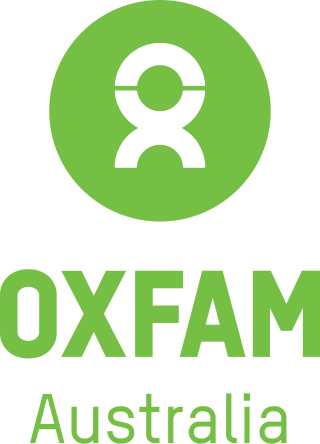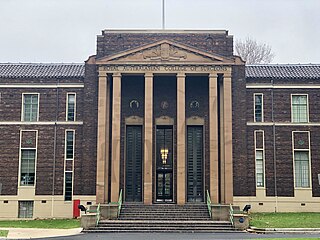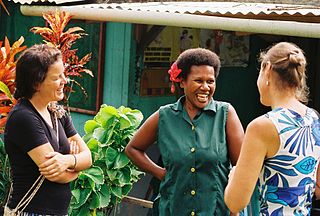
The United Nations Relief and Works Agency for Palestine Refugees in the Near East (UNRWA) is a UN agency that supports the relief and human development of Palestinian refugees. UNRWA's mandate encompasses Palestinians displaced by the 1948 Palestine War and subsequent conflicts, as well as their descendants, including legally adopted children. As of 2019, more than 5.6 million Palestinians are registered with UNRWA as refugees.

A grant is a fund given by a person or organisation, often a public body, charitable foundation, a specialised grant-making institution, or in some cases a business with a corporate social responsibility mission, to an individual or another entity, usually, a non-profit organisation, sometimes a business or a local government body, for a specific purpose linked to public benefit. Unlike loans, grants are not intended to be paid back. Examples include student grants, research grants, the Sovereign Grant paid by the UK Treasury to the monarch, and some European Regional Development Fund payments in the European Union.

The Australian Nursing and Midwifery Federation (ANMF) is the largest union in Australia, with 274,956 members in 2018. The union is run by nurses, midwives and assistants in nursing to advance the industrial, political and professional interests of its members.
Australian Volunteers International or AVI recruits skilled professionals from Australia to work with partner organisations in Asia, the Pacific, Africa and the Middle East. Its work focuses on reducing poverty, promoting human rights and gender equality, increasing access to education and health services, and protecting the environment.

Australian Aid is the brand name used to identify projects in developing countries supported by the Australian Government. As of 2014 the Department of Foreign Affairs and Trade (DFAT) has been responsible for Australia's official development assistance to developing countries.

Oxfam Australia is an Australian, independent, not-for-profit, secular, community-based aid and development organization, and is an affiliate of the Oxfam International Confederation. Oxfam Australia's work is divided into four broad categories covering climate justice, Economic Justice, Gender Justice and First Peoples Justice as well as Humanitarian response. They believe that poverty in the 21st century is less a problem of scarcity but the result of how resources, opportunities, and protections are distributed and wielded.
International aid has been provided to Palestinians since at least the 1948 Arab–Israeli War. The Palestinians view the aid as keeping the Israeli–Palestinian peace process going, while the Israelis claim that it is used to fund terrorism and removes the imperative to Palestinians to negotiate a settlement of the Israel-Palestinian conflict. The Palestinian National Authority (PA), within the West Bank and Gaza Strip, receives one of the highest levels of aid in the world. Aid has been provided to the Palestinian Authority, Palestinian non-governmental organizations (PNGOs) as well as Palestinian political factions by various foreign governments, international organisations, international non-governmental organizations (INGOs), and charities, besides other sources.
Muslim Aid is a UK based Islamic International Non-Governmental Organization (INGO). The international humanitarian charity has relief and development programmes in countries across Africa, Asia, and Europe. The UK's second oldest Muslim charity, Muslim Aid celebrated its 35th anniversary in 2020. The charity works to support and empower people suffering the effects of poverty, war, and natural disaster through both emergency relief and sustainable programmes designed to provide long-term support and independent futures to the most vulnerable communities around the world. The charity is a long standing member of a number of umbrella organisations including BOND, NCVO and is one of the founding members of the Muslim Charities Forum. Traditionally supported by its local communities, it has established partnerships with major institutional funders around the world including the UN World Food Programme (WFP), The UN Refugee Agency, DFID, European Commission (ECHO) and others.
The Australian Council For International Development (ACFID) is an independent national association of Australian non-government organisations (NGOs) working in the field of international aid and development. ACFID was founded in 1965, with Syd Einfeld as Chairman, and has over 130 members working in 90 developing countries and supported by over 1.5 million Australians. It lobbies for non-government aid organisations, and Australian government development aid.

The Royal Australasian College of Surgeons (RACS) is the leading advocate for surgical standards, professionalism and surgical education in Australia and New Zealand.
World Vision Australia (WVA) is an ecumenical Christian non-governmental organisation based in Melbourne, Australia. It is a part of the World Vision International Partnership led by World Vision International. WVA is Australia's largest overseas aid and development organisation, operating primarily to assist overseas communities living in poverty. It also carries out development work in Australia with First Nations communities.

Volunteer Service Abroad - Te Tūao Tāwāhi (VSA) a New Zealand-based volunteering agency working in international development.

The diplomatic relationship between the United States of America and Zambia can be characterized as warm and cooperative. Relations are based on their shared experiences as British colonies, both before, after and during the struggle for independence. Several U.S. administrations cooperated closely with Zambia's first president, Kenneth Kaunda, in hopes of facilitating solutions to the conflicts in Rhodesia (Zimbabwe), Angola, and Namibia. The United States works closely with the Zambian Government to defeat the HIV/AIDS pandemic that is ravaging Zambia, to promote economic growth and development, and to effect political reform needed to promote responsive and responsible government. The United States is also supporting the government's efforts to root out corruption. Zambia is a beneficiary of the African Growth and Opportunity Act (AGOA). The U.S. Government provides a variety of technical assistance and other support that is managed by the Department of State, U.S. Agency for International Development, Millennium Challenge Account (MCA) Threshold Program, Centers for Disease Control and Prevention, Department of Treasury, Department of Defense, and Peace Corps. The majority of U.S. assistance is provided through the President's Emergency Plan for AIDS Relief (PEPFAR), in support of the fight against HIV/AIDS.
A community legal centre (CLC) is the Australian term for an independent not-for-profit organisation providing legal aid services, that is, provision of assistance to people who are unable to afford legal representation and access to the court system. They provide legal advice and traditional casework for free, primarily funded by federal, state and local government. Working with clients who are mostly the most disadvantaged and vulnerable people in Australian society, they also work with other agencies to address related problems, including financial, social and health issues. Their functions may include campaigning for law reform and developing community education programs.
Association Najdeh (AN) is a NGO involved with development and educational projects in Palestinian refugee camps in Lebanon. It operates more exactly in and around the refugee camps. It defends the Palestinian refugee women who are often victims of discriminations and also participates in different campaigns, in coalitions of local and international organizations, for the right to work in Lebanon and the right of return to Palestine.

The Union of Agricultural Work Committees (UAWC) is a Ramallah based Palestinian non-profit organization that was established in 1986 to improve the performance and professionalism of Palestinian farmers. The Union also aims to help Palestinian farmers market their produce and provides agricultural employment opportunities through a framework of cooperation with domestic, Arab, and international agricultural development institutions.
International volunteering is when volunteers contribute their time to work for organisations or causes outside their home countries. International volunteering has a long association with international development, with the aim of bringing benefits to host communities.

Naw K'nyaw Paw is a Karen peace activist who works for women's rights in Myanmar. She is the General secretary of the Karen Women’s Organisation, and won an International Women of Courage Award in 2019.
The Palestinian NGOs Network is an umbrella organization of Palestinian non-government organisations (NGOs) in the Palestinian territories formed to enhance coordination, consultation and cooperation between member NGOs and to strengthen Palestinian civil society and contribute to the establishment of a Palestinian state. PNGO was formed in September 1993, and as of January 2020, had 135 member NGOs operating in the West Bank, Gaza Strip and East Jerusalem.













